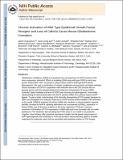Chronic Activation of Wild-Type Epidermal Growth Factor Receptor and Loss of Cdkn2a Cause Mouse Glioblastoma Formation
Author(s)
Whittaker, Charles A.; Charest, Alain; Acquaviva, Jaime; Jun, Hyun Jung; Lessard, Julie; Ruiz, Rolando; Zhu, Haihao; Donovan, Melissa; Woolfenden, Steve; Boskovitz, Abraham; Raval, Ami; Bronson, Roderick T.; Pfannl, Rolf; Housman, David E; ... Show more Show less
DownloadHousman_Chronic activation.pdf (3.178Mb)
OPEN_ACCESS_POLICY
Open Access Policy
Creative Commons Attribution-Noncommercial-Share Alike
Terms of use
Metadata
Show full item recordAbstract
Glioblastoma multiforme (GBM) is characterized by overexpression of epidermal growth factor receptor (EGFR) and loss of the tumor suppressors Ink4a/Arf. Efforts at modeling GBM using wild-type EGFR in mice have proven unsuccessful. Here, we present a unique mouse model of wild-type EGFR-driven gliomagenesis. We used a combination of somatic conditional overexpression and ligand-mediated chronic activation of EGFR in cooperation with Ink4a/Arf loss in the central nervous system of adult mice to generate tumors with the histopathologic and molecular characteristics of human GBMs. Sustained, ligand-mediated activation of EGFR was necessary for gliomagenesis, functionally substantiating the clinical observation that EGFR-positive GBMs from patients express EGFR ligands. To gain a better understanding of the clinically disappointing EGFR-targeted therapies for GBM, we investigated the molecular responses to EGFR tyrosine kinase inhibitor (TKI) treatment in this model. Gefitinib treatment of primary GBM cells resulted in a robust apoptotic response, partially conveyed by mitogen-activated protein kinase (MAPK) signaling attenuation and accompanied by BIM[subscript EL] expression. In human GBMs, loss-of-function mutations in the tumor suppressor PTEN are a common occurrence. Elimination of PTEN expression in GBM cells posttumor formation did not confer resistance to TKI treatment, showing that PTEN status in our model is not predictive. Together, these findings offer important mechanistic insights into the genetic determinants of EGFR gliomagenesis and sensitivity to TKIs and provide a robust discovery platform to better understand the molecular events that are associated with predictive markers of TKI therapy.
Date issued
2011-10Department
Massachusetts Institute of Technology. Department of Biology; Koch Institute for Integrative Cancer Research at MITJournal
Cancer Research
Publisher
American Association for Cancer Research
Citation
Acquaviva, J., H. J. Jun, J. Lessard, R. Ruiz, H. Zhu, M. Donovan, S. Woolfenden, et al. “Chronic Activation of Wild-Type Epidermal Growth Factor Receptor and Loss of Cdkn2a Cause Mouse Glioblastoma Formation.” Cancer Research 71, no. 23 (November 29, 2011): 7198-7206.
Version: Author's final manuscript
ISSN
0008-5472
1538-7445